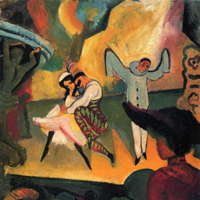 ROMANTICISM: Explore the late George Colerick's fascinating series of articles encroaching on the subjects of melody, romanticism, operetta and humour in music.
ROMANTICISM: Explore the late George Colerick's fascinating series of articles encroaching on the subjects of melody, romanticism, operetta and humour in music.
- Netherlands
- Simone Young
- Byron Wallis
- Detroit Symphony Orchestra
- Messe des pêcheurs de Villerville
- Richard Strauss: Don Juan
- Auditorium Conciliazione
- Ben Byram-Wingfield
 UPDATES: There's a new feature every day at Classical Music Daily. Read about the various ways we can keep in touch with you about what's happening here.
UPDATES: There's a new feature every day at Classical Music Daily. Read about the various ways we can keep in touch with you about what's happening here.
Rossini's Adolescent Opera
GIUSEPPE PENNISI reports from Pesaro
on 'Demetrio e Polibio'
The 2019 Rossini Opera Festival's second offering was Demetrio e Polibio, a revival of the 2010 production I reviewed in Music & Vision on 14 August 2010 - Rough and Shining Jewels. Rossini composed it at the age of sixteen for the Mombelli family, a four singer travelling company active at the time in central Italy. In 1812, it was on the stage of the important Teatro Valle in Rome. It was performed quite often all over Italy until 1825, when it disappeared. One of its many versions was revived years ago at the Festival di Valle d'Itria in Martina Franca and, on 10 August 2010, the first 'revision on the original sources' was unveiled at the ROF. Even now, it hard to say which arias and duets belong to Rossini and which to the rest of the Mombelli team.
It must not be compared with the works of the adolescent Mozart who, at the age of fourteen, composed an outright masterpiece such as Mitridate Re del Ponto. Demetrio e Polibio is rather weak and at times quite boring. It has, however, two important innovations: the role of the young man in love is written for a mezzo in trousers, rather than for a castrato, as was still the practice, and that of the father for a baritenor - a tenor who would emphasize the central register and could reach low tonalities. The libretto by Vincenzina Viganò-Mombelli is neither better nor worse than that of other old-fashioned tales dealing with thrones, depositions and recognitions. Their main inspiration was Metastasio's opera seria, where the action was not on stage but primarily told by the singers in long arias and occasionally duets and quartets. Just the type of opera seria that Rossini himself demolished when he was a young adult. As early as in Tancredi, Rossini developed an entirely different opera seria, both in substance and in form as well as in structure and content.
However, Demetrio e Polibio is not merely a curiosity for musicologists or the fetish of the 'first opera' by an adolescent and still green composer who later became a great musician. There is an unusual interplay of paternal and filial love, along with the customary affair between two youngsters. There are a few fascinating pages. The careful listener can sense the seeds of later and more mature works. In short, it's a rough but pleasant draft of what Rossini, then adolescent, had in store for the future.
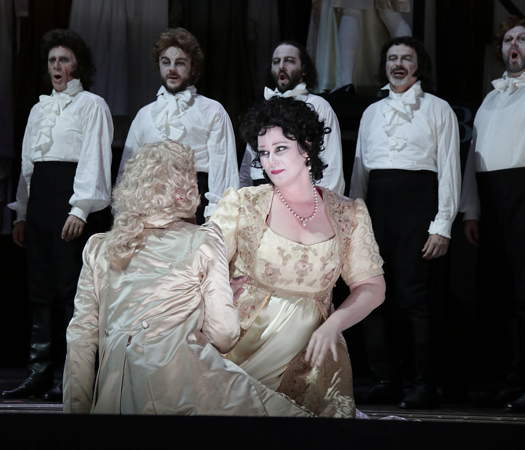
Cecilia Molinari in her trouser role with Jessica Pratt (seen from the back) and members of the chorus in Demetrio e Polibio at the Rossini Opera Festival. Photo © 2019 Studio Amati Bacciardi
The production is simple and low cost. Because of the lack of real action, stage director Davide Livermore presents this dramma serio per musica in due atti as 'theatre within a theatre'. On a semi-empty modern stage, members of the Mombelli company (or their ghosts) perform the opera; the audience sees it from backstage. The four characters (and singers) emerge in their early nineteenth century attire but pretending to be part of the antiquity. The stage set and costumes are the work of the Accademia delle Belle Arti di Urbino - a University group. As compared to the 2010 edition, this 'theatre within a theatre' approach is more fluid, also because the singers / actors are very experienced and internationally well-known, whereas nine years ago they were just fresh graduates of the Rossini Academy. Jessica Pratt was a strong-willed and forceful Lisinga; she seemed to be a character both inspired by some Mozart roles - eg Konstanze in Die Entführung aus dem Serail - and anticipating some of Rossini's important roles, such as Isabella in L'Italiana in Algeri.
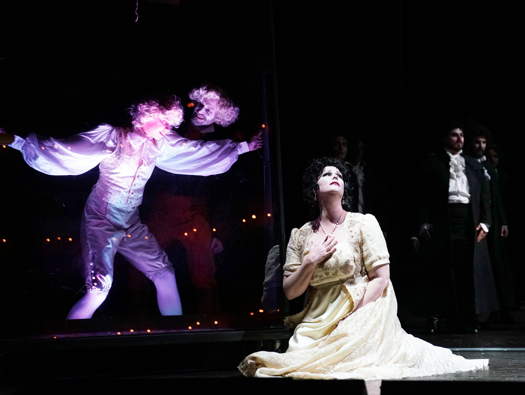
Jessica Pratt as Lisinga in Demetrio e Polibio at the Rossini Opera Festival. Photo © 2019 Studio Amati Bacciardi
Juan Francisco Gatell does an excellent job as a baritenor - almost a new vocal line for him.
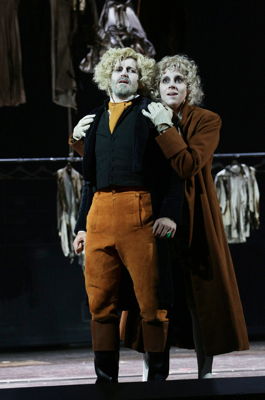
Juan Francisco Gatell and Cecilia Molinari in Demetrio e Polibio at the Rossini Opera Festival. Photo © 2019 Studio Amati Bacciardi
Cecilia Molinari is quite effective in a trouser role, and Riccardo Fassi is good at both acting and singing.
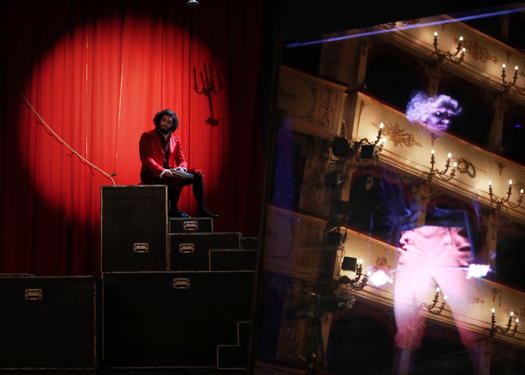
Riccardo Fassi in Demetrio e Polibio at the Rossini Opera Festival. Photo © 2019 Studio Amati Bacciardi
Paolo Arrivabeni conducts the Filarmonica Gioacchino Rossini. Mirca Rosciani leads the chorus of the Teatro della Fortuna di Fano. There was warm applause for everyone from the sympathetic audience. However, I wonder if it is better to revive this work or to propose some of Rossini's pastiches such as Ivanhoe, never staged at the Rossini Opera Festival.
Copyright © 15 August 2019
Giuseppe Pennisi,
Rome, Italy



